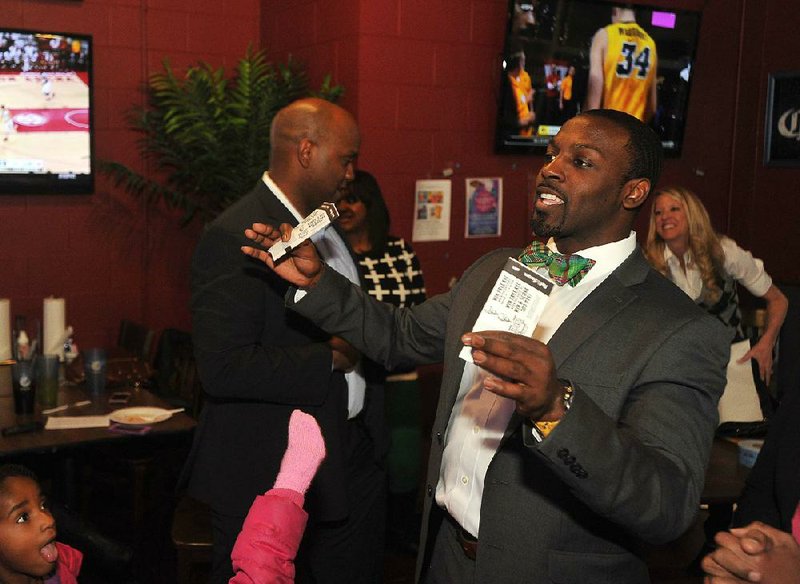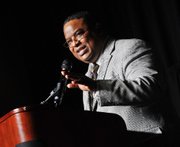Music options in Northwest Arkansas are growing along with the region's population.
A pair of urban radio stations launched Jan. 1, giving the area's approximately 500,000 people more of the variety they might find in similarly sized metropolitan areas. KDIV-LP, 9̶8̶.̶9̶ 98.7* FM, and KQIS, 105.3 FM, give the Fayetteville-Springdale-Rogers metropolitan area its first urban stations after years of the market being dominated by country, Top 40 and sports talk.
"This isn't your great-grandmother's Northwest Arkansas," said Marcus Carruthers, vice president of Perry Publishing and Broadcasting, which owns KQIS. "We're excited about changing the landscape."
The mix of hip-hop, R&B, jazz and gospel that the stations are introducing to the region is a project decades in the making. Companies have been reminded for years by recruits and exiting employees that for all its positives, the region has been lacking when it comes to radio, executives with the new stations said.
Northwest Arkansas has gained national attention for its Crystal Bridges Museum of American Art and its regional trail system, but the addition of these radio stations is something that will have more daily impact on residents, said Reggie Brasfield, executive director of KDIV.
"We're in our cars, driving to work five to six times a week," Brasfield said. "This is about improving day-to-day life. Launching the station hasn't been easy, and there have been sacrifices, but it's something we believe very strongly in doing."
Outside of some similar programming, and shared goals of informing and educating the local community, there are distinct differences between the two stations.
KDIV is a low-powered, noncommercial station. It is part of the nonprofit Voice of Diversity Organization and will exist largely on grant funding and donations. It cannot sell advertising because of Federal Communication Commission rules governing low-powered stations. The rules require it to offer community educational programming.
Brasfield and the station are waiting to move into a permanent studio location, and for the time being are operating out of a local residence. Programming currently is done by Brasfield with an assist from KLEK-LP, 102.5 FM, in Jonesboro. As with its northeast Arkansas counterpart, the nonprofit Fayetteville station will be run by volunteers.
A five-person board -- made up of professionals from retail, health care and education -- oversee KDIV. Funding is currently coming through a line of credit from a local bank.
"We can't really grow until we get the community involved," Brasfield said.
KQIS, on the other hand, is part of Perry Publishing and Broadcasting, an Oklahoma City media corporation founded in 1979 by Russell Perry. He launched the company with The Black Chronicle newspaper, and it has grown to include 22 radio stations -- across a variety of formats -- in Oklahoma, Georgia, South Carolina, Florida and now Arkansas.
Currently the company is remodeling a 2,800-square-foot space on Dickson Street in Fayetteville. It will be on the ground floor of The Dickson, an office space and condo building in one of the city's more trafficked entertainment areas.
Advertising revenue ultimately will determine the success of KQIS, which will have a staff of eight. Its studio will be in a space with a large window facing the street, giving passers-by a chance to see disc jockeys and special guests at work.
"We want to create an experience right here on Dickson Street that you can't get anywhere else," Carruthers said.
Music and entertainment are only part of what drive the efforts behind KDIV and KQIS.
Both Northwest Arkansas stations are seeking to fill cultural gaps identified by the Northwest Arkansas Council in a 2014 survey titled "Engagement of Diverse Communities in Northwest Arkansas."
Focus groups were quizzed on education, transaction and experience-driven opportunities. Black participants in the study identified ethnic radio stations as one of the major missing pieces in Northwest Arkansas.
Respondents to the survey noted that they didn't feel fully informed about programs and events of interest through existing local news options. Sixty-one percent of study participants -- made up of representatives from the black, Hispanic, Asian and Marshaleese communities -- said they received news through existing media outlets.
Blacks make up about 2 percent of the population in Northwest Arkansas. That figure is slightly higher in Fayetteville at 6 percent. Regional leaders and executives at three Fortune 500 companies and other major employers have expressed a desire to see those numbers grow as they recruit the best workers from around the U.S. and world.
Neither station is geared exclusively toward a black audience, but both seek to provide the black community something that has been missing for decades. Similarly, a local Univision affiliate recently launched a local newscast for the region's Spanish-speaking residents.
"As a region we have to make sure we're offering options and alternatives to our residents," said Mike Malone, president and CEO of the Northwest Arkansas Council. "Whether they've lived here from birth or moved here from other markets or countries, we want to give residents what they are looking for. You find these stations on the dial in large markets. We're becoming a much larger market, so this is a natural progression.
"We're also a very youthful market with a high percentage of students and millennials who are here in our workforce," Malone said. "I think these stations will play very well with those demographics, as well."
Carruthers, an Oklahoma City native and family friend of the Perry family, moved to Northwest Arkansas in 1995. He currently serves as pastor of the Dwelling Place Church and before joining the ministry worked for Tyson Foods and Wal-Mart.
Upon moving to the region 20 years ago, he noticed the lack of variety on the radio, something Brasfield noted when he moved to Bentonville in 2006. Co-workers transplanted from larger cities -- regardless of their race -- have also noted the need for improved radio options, they said.
Brasfield and Carruthers see the radio stations as launching points for more education and entertainment offerings. They believe Northwest Arkansas can support more than the pop and country artists that have largely dominated the stage of the Arkansas Music Pavilion (AMP) in Rogers.
"You're going to feel like you're in a different Northwest Arkansas," Carruthers said. "We hope to partner with Wal-Mart and bring things to the AMP that will make you think you're in Atlanta, Los Angeles, New York City, Dallas or Memphis. Northwest Arkansas will become a new hot spot for people to experience culture and diversity like never before."
SundayMonday Business on 01/31/2016
*CORERCTION: Fayetteville radio station KDIV-LP is located at 98.7 FM. Its positioning on the radio dial was incorrectly reported in this article.

